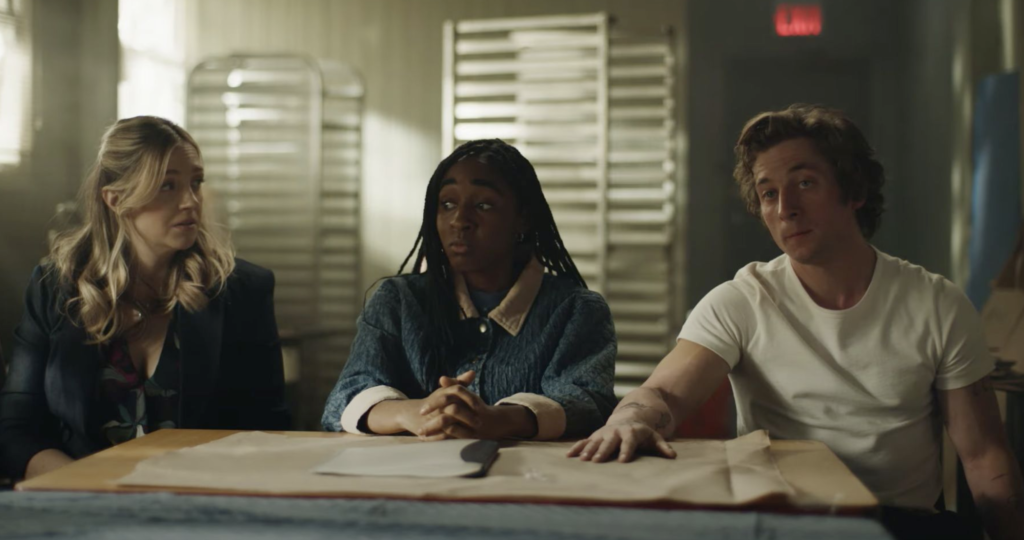Genre: Drama
Premise: (from Black List) After a young, newly widowed janitor in a small mining village is unexpectedly elected Mayor, she navigates a new relationship with a mysterious man from the city and tries to determine how to use her new position of power to confront the corruption that has plagued the town for years.
About: This script finished pretty high on the Black List last year, with 13 votes. The writer has produced a few small projects and has mainly worked in short films.
Writer: Brendan McHugh
Details: 92 pages
 Dakota Johnson for Sasha?
Dakota Johnson for Sasha?
Every once in a while, you read a logline on the Black List and you say, “This is such a bad logline that the script must be amazing.” In other words, your script would have to be great to overcome this logline.
This has happened a few times before – where I’d see a terrible logline that was summarizing an equally terrible concept but then something about the writer’s voice or the characters in the script blew me away. It doesn’t happen often. But it does happen. Will it happen again today?
Sasha is a maid in a small corrupt mining town that’s basically run like the mafia by the town’s mining czar, Pike. Technically, the town has a mayor (who’s Sasha’s boss), but he’s a mayor in name only. His sole duty is to do what Pike tells him to do.
Sasha has a particularly combative relationship with Pike due to the fact that her husband recently died in the mines and instead of Pike giving her his life insurance, he tells her that her husband was liable, so there’s no insurance to pay out.
And, oh yeah, Sasha is eight months pregnant.
When Sasha is at her lowest point, a cool-as-a-cucumber surveyor named Jack rides into town on his motorcycle. He asks Sasha out on a date and she says yes. The two have a great time.
The next day, the mayor tells Sasha that reelection is coming up and the election is not official unless he has an opponent so she has to run against him. She doesn’t want to but he forces her to sign the papers. When the miners (who are mostly drunk all the time) learn that Sasha is up for the job, they get excited and Sasha ends up winning in a landslide.
Sasha then starts changing things around town. And helping the miner get better pay. Pike sits her down and says if she gets any chummier with the workers, he’s going to kill her. But she’s already in it. There’s no turning back now.
She enlists her new semi-boyfriend (Jack) for help, only to realize that he was secretly working for Pike this whole time! Jack swears he’s had a change of heart and wants to help Sasha. But can she trust him? Going off the many seasons of Love Island I’ve watched, I can tell you that when a man lies, he’s going to lie again! Stay away from him, girl! But who knows. Maybe Jack will surprise us.
What a weird script.
For starters, it does an excellent job making you love the main character. If you ever want to create a protagonist the audience loves, make your protagonist someone who’s being taken advantage of. And if you want the audience to love them even more, put them in a really crappy situation as well. Someone in a crappy situation who’s being taken advantage of is the screenwriting equivalent of saving thousands of cats.
You just feel for this poor woman. Her husband died. And this a-hole mine czar b.s.’s her about the insurance, saying her husband was negligent so she gets no money to raise her child. We hate this guy more than anything. And, of course, we’re rooting for our screwed-over protagonist to defeat him.
So that part of the script was great which, by the way, is the hardest part of the script to get right. Getting a reader to fall in love with and care about your protagonist is super difficult to do. You could write a thousand-page screenwriting book on how to achieve this and, still, 90% of screenwriters would struggle with it.
Pike is a great villain as well. You know who he reminded me of? Mr. Potter in It’s A Wonderful Life. But even nastier. Cause this guy is willing to kill you if you don’t do what he says.
If you’ve got a hero we love and a villain we hate, you’ve got a readable screenplay. Because when stories are told well, they’re an EMOTIONAL EXPERIENCE. The reader is FEELING SOMETHING. The more you’re making them feel, the more they’re going to like your script.
So the fact that we love Sasha and hate Pike does the heavy lifting for Pikesville.
Which is why it’s such a bummer that everything outside of the character work stinks like last night’s fettuccine alfredo. Nothing about this situation feels real. There’s zero specificity. I don’t know what state this is. I don’t even know what COUNTRY this is. Come to think of it, I don’t even know what YEAR it is.
I don’t know if the writer kept these secrets as a deliberate creative choice. But I don’t think he did. None of the character names were capitalized in this script when they were introduced. That tells me this is a newbie writer. And if they’re a newbie writer, they’re more inclined to make mistakes like being too general with the setting.
Why does this matter? Cause this movie plays different if it’s 1975 as opposed to 2023. Women’s rights weren’t nearly as advanced back then as they are today. Which would imply that the writer was making a commentary about that time. But it seems like it’s 2023 and yet we’re treating this girl like she lives in Russia 50 years ago. It’s hard to grasp what’s happening culturally.
This extended into the major plot beats of the script.
I consider major plot beats to be the pillars that hold your screenplay up. You need them to be strong. The first major plot beat here is the mayor saying to his cleaning lady, “You’re running against me for mayor.”
When has this ever happened in the history of the world?
That’s not a pillar made of stone. It’s a pillar made of styrofoam.
One last observation I had was that this is one of the slimmest scripts I’ve read all year. It’s so sparse. And that’s… a good thing? Right? We talk about it all the time. Make the script easy to ready. Keep your prose as sparse as possible.
That’s true for CERTAIN GENRES. But not for every genre. Some genres need more meat. You couldn’t write The Godfather, for example, with 2 line paragraphs all the way through. You wouldn’t be able to add the density necessary to give the story its required weight.
Same thing with Guardians of the Galaxy. There’s too much in that world that needs to be explained for them to distill it down to quick ‘soundbite’ paragraphs.
And I would argue it’s the same for Pikesville. It needed more description of the town, of the setting, of the people. It needed more detail in the interactions in order to convey the complexity of the relationships. Writing this in the style of a 90 minute thriller was not a good decision.
Main character was great. Villain was great. Any time those two were in a scene together, I was on the edge of my seat. But nothing else in the script worked, unfortunately. So I can’t endorse this.
[ ] What the hell did I just read?
[x] wasn’t for me
[ ] worth the read
[ ] impressive
[ ] genius
What I learned: When major plot points arrive in your script, make sure they’re rock solid. The audience must believe in them 100% or else your story will fall apart. Who’s going to believe that a mayor forces his cleaning lady to run against him? I’m not even convinced you can get away with that in a comedy.
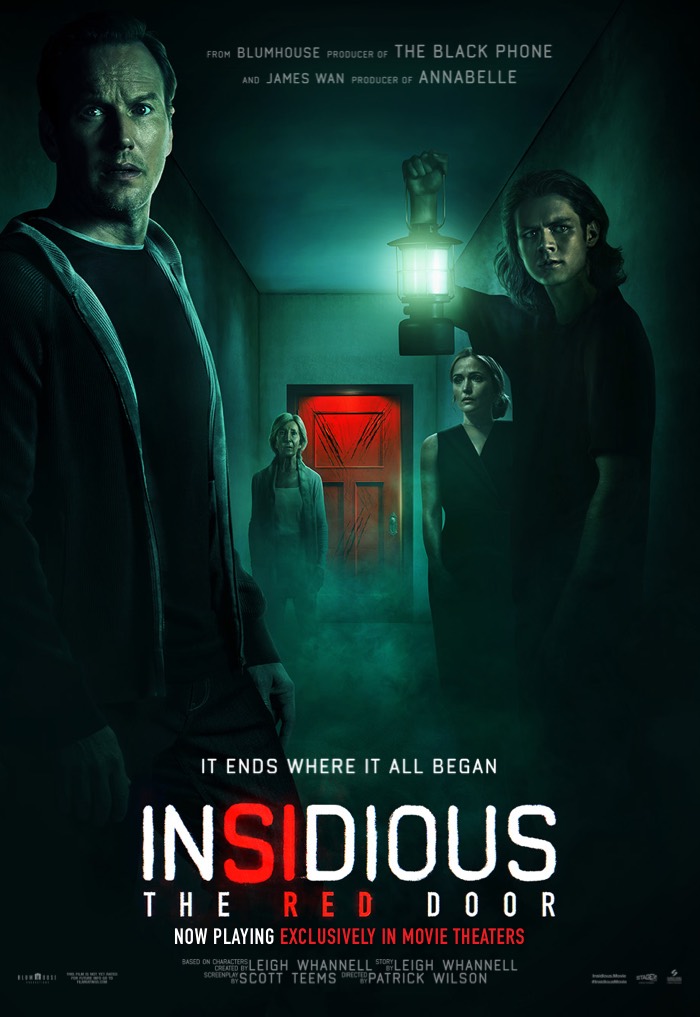
Upon first glance, the weekend box office looks insignificant. The only movie that opened wide was a smaller studio horror movie, Insidious 4.
But I would argue that this weekend’s box office is one of the most important box offices of the year. The box office is its own form of AI, an accumulation of the collective consciousness of every potential moviegoer in the world. And, therefore, when it delivers a number, it is making a point. It is trying to tell us something.
So what is it trying to tell us by anointing Insidious as the biggest movie of the weekend, a small horror franchise that isn’t even associated with an identifiable image?
To answer that question, we must first acknowledge what’s been happening to Disney movies as of late. Disney took over the industry for a decade. It was a super-hitmaker the likes of which had never been seen before in Hollywood. It had Pixar, Marvel, Star Wars, its own animation library, and its live-action animation remakes. The studio pumped out billion-dollar hits like it was Michael Jackson in the 80s.
But everything has changed. Here are some of their recent releases…
Strange World
Elemental
Buzz Lightyear
Ant-Man
The Little Mermaid
Eternals
Why is this relevant? Because Disney drove the business strategy that all the other studios were forced to adapt to in the 2010s. Which was to create super-movies. In the 90s, they would’ve called these “tentpoles.” But Disney took that concept to a new level. Tentpoles didn’t bring in enough money. They wanted SUPER-TENTPOLES – these gigantic movies that created their own orbit they were so big.
The reason was because a super-tentpole could net them half a billion dollars. If you could net half a billion dollars with one movie, why would you concern yourself with making Insidious’s? Insidious may have doubled its budget with its opening weekend take of 30 million bucks. But in “Disney” parlance, that’s a pittance. A 50 million dollar profit when it’s all said and done is weak-sauce when compared to 500 million.
And for a while, that operating procedure worked.
But here’s the problem.
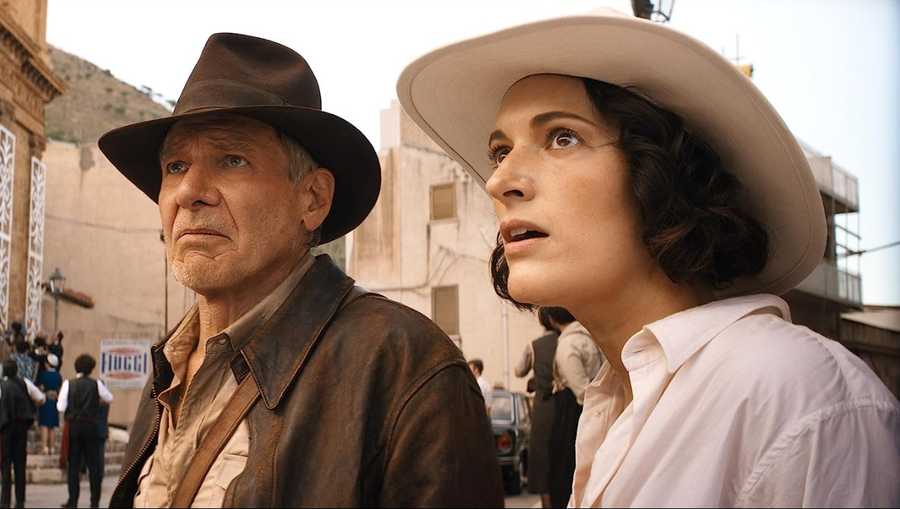
When you make 300 million dollar movies that don’t do well, such as Indiana Jones, you don’t lose 15 million bucks. You lose 150 million. Or 250. Or 350. And while, before, Disney was so successful that they could weather one of these occasional duds, they’re starting to fail a lot more now.
I don’t care who you are. If you’re losing 200+ million a movie? You’re not going to be around for long. And Disney is losing a lot more than they’re winning these days.
Bringing this back to Insidious, studios may have to reevaluate their business strategy. Maybe super-movies aren’t the way to go anymore. They’re too darn risky. And it’s not just because of the pandemic. It’s because they got lazy. They got real real lazy over the last decade and they thought anything with a superhero in it would make a billion bucks. They thought any live-action remake of one of their cartoons would make a billion bucks. They thought any sort of nostalgia would make a billion bucks.
THEY STOPPED INNOVATING.
I say it all the time here. Audiences will NOT EAT EVERYTHING UP. You do have to take some chances. Or, if you’re going to stick with the tried-and-true superhero genre, you have to innovate in *some* capacity. And they’re just not doing that right now.
To be honest, I don’t know if they know how to innovate anymore. When was the last time they tried?
Next weekend’s going to be interesting because Mission Impossible comes out and I don’t know if people are going to see it. It is the definition of something we get ALL THE TIME. And if Fast and Furious is any indication of what to expect, Tom Cruise could be in trouble. By the way, what’s up with Tom? The guy is more concerned with hyping up his competition than his own films!
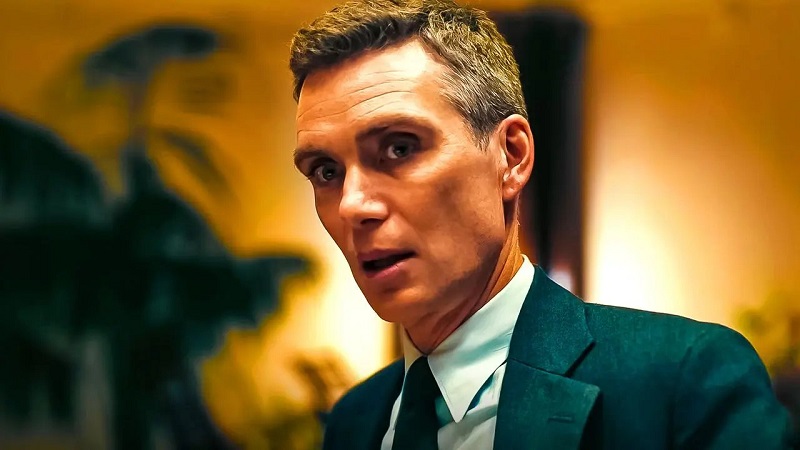
Following Mission Impossible is going to be one of the weirdest movie weekends I can remember, with Barbie and Oppenheimer opening. To be fair, Oppenheimer is doing exactly what I just asked for, which is to innovate. There hasn’t been a movie like this in decades. Which on the one hand is great. I just don’t know how you pull in a lot of money from a movie that’s not going to have a single female in the audience. Does anyone know a woman who’s going to see this movie?
While unimaginable six months ago, Barbie looks like it’s going to be the film of the summer. It looks like it’s going to be huge. And I *do* think Barbie is trying something different. It looks like it’s hiding very adult subject matter inside a fun summer movie. Which means it’s going to bring in young and old audiences. I have to commend Greta and Margot. I didn’t think they could do it. Yet, here they are. No one’s talking about any movie this summer as much as they’re talking about Barbie.
By the way, for those of you who don’t know, the Barbie movie has been in development for a decade. Ten years ago, Diablo Cody was hired to write the film with Amy Schumer starring. I think we all did a little prayer thanking our lord and savior that that didn’t happen.
But what’s interesting is that Diablo came out this week explaining why their movie didn’t get greenlit and it’s because the studio wanted to deconstruct Barbie and basically crap all over the brand – say all this stuff about how femininity was bad and girls wanting to look like Barbie was bad. And Diablo just couldn’t make it work because that’s not Barbie. How do you make a movie about Barbie where the theme is, “Barbie is bad.” It was impossible to crack.
Whereas it seems, now, they’re making this movie to celebrate Barbie. But it’s also subtly acknowledging that times have changed.
Maybe the biggest surprise this weekend was the conservative film Sound of Freedom, which added another 18 million bucks to its take, allowing it to top 40 mil. This is another genre that isn’t going to get you superhero returns but it’s also not going to strap you with superhero losses if it bombs.
The problem with conservative films in the past has been that they’re too faith-based. Which basically keeps them niche. Cause liberal audiences don’t care about religion. So what Taylor Sheridan introduced was this idea that you could play to other more profitable aspects of conservative beliefs (justice, survival, connection to nature, family), the kind of stuff that works better inside the feature fictional format.
If more conservative writers realized that, there’s a huge market to be tapped there, as Sound of Freedom has proven.
This could be the future of the box office if these giant movies keep failing. Cause it’s not just Disney. It’s WB as well. Superheroes are no longer teflon. Spider-Man, maybe. But that’s because he’s the best superhero. So, of course his movies are going to do well. But everyone else? They’re in trouble.
Which means getting smarter and exploiting these neglected crevices in the market. Or just write horror films. Cause horror films always do well.
Speaking of horror, I bucked up and got MGM Plus so I could watch that show, “From.” A few of you told me it was awesome. I finally listened. I watched the pilot and it was indeed, very good.

For those who don’t know, the show is about this town in the middle of nowhere that people are stuck in. If you drive out on the road, you always loop back to the town automatically. What’s interesting is that people keep showing up. Every couple of weeks, a new person or family will drive into the town, lost, wondering where they are. When they’re told they’re forever stuck here, they of course try to leave, only to keep looping back into town. It’s a fun little premise. And it also has these monsters that come out at night, which forces everyone to be home by nightfall. It’s one of those rare gems that treats their setup with such respect that it doesn’t come off as cheesy.
I don’t know if you remember that disaster on NBC called La Brea about the people who fall into a wormhole and end up in Los Angeles a million years ago. If you watch “La Brea” and then watch “From,” you’ll notice the sophistication in the writing is night and day. One understands how to do their genre premise right. The other makes almost every mistake in the book.
Anyway, I loved the pilot episode. I’m going to keep watching. If you want to check it out, the first 7 days of MGM Plus are free.
But, despite my overall love for the pilot, I did want to highlight one major mistake in “From” only because I see this in screenplays ALL THE TIME and it drives me insane. I call it “dialogue tunnel vision.” Dialogue tunnel vision is when you get so determined to write a certain line of dialogue, that you’re unable to realize how inappropriate the line is within the context of the moment.
So, in the pilot, this lost family in an RV rolls into the town. They’re confused. They coulda swore they were supposed to run into a highway by now. And it just so happens that they arrive during a town funeral. Two people were killed last night by the monsters.
The RV parks next to the service, which is ending. As the townspeople all walk away from the service, the teenaged daughter in the RV opines to her family, sarcastically, “They seem like a cheery group.”
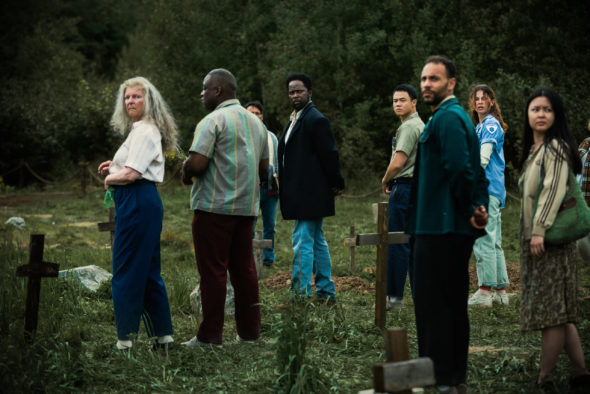
Now, I want you to think about this line for a second. Cause this is the epitome of dialogue tunnel-vision. I know exactly what the writer was thinking. They were thinking, “Let’s establish that something weird is going on in this town. The people aren’t right. They’re not acting normal. Let’s have our outsiders vocalize that.”
But the writer had so much tunnel-vision in establishing that reality with this observational line of dialogue, that he completely overlooked the fact that ALL OF THESE PEOPLE WERE JUST LEAVING A FUNERAL!!!! Who has ever looked cheery after a funeral? What the daughter is saying, objectively, makes zero sense. Why would you expect anyone to be looking cheery right now? Hence, dialogue tunnel-vision.

I’ve got a couple of other examples for you. In Gareth Edwards’ first movie, “Monsters,” about these giant monsters that lived in the jungles, we watch this couple who has to travel through one of those jungles. Everywhere you looked, in that movie, there was a sign that said, “Warning: Giant Monsters Ahead.” Then, halfway into the jungle, the couple hear this loud terrifying gurgling grumble off-screen and the husband says to the wife, I kid you not, “What was that?”
IT WAS THE MONSTERS!!!!!!!! ARE YOU DENSE OR SOMETHING????!!!!!
But, again, Gareth Edwards wanted that line in there. He wanted to, I don’t know, create suspense or something. He wanted that quiet scared moment where his characters tried to figure out what was making such a strange noise, despite the fact that the whole movie you’d written up to that point told us exactly what it was.
And then, we can’t leave the dialogue non-master, George Lucas, out of this, who, in Attack of the Clones, when Padme’s double lays dying on the ship platform after her ship blew up, Padme runs up to her and her double, in her last breaths, says, “I’m sorry your highness. I failed you.”
Uhhhhh, no you didn’t fail her. You actually did exactly what you were supposed to do!!! You made the bad guys think you were Padme, so that they tried to kill you instead of her. But Lucas was so zoned in on delivering that line, he couldn’t see the forest through the trees.
So just be aware of this, please. Place yourself in the reality of the moment and ask what would really be said in that moment. Don’t just write dialogue that you wanna write. Cause it may not stand up to the scrutiny of the situation.
What’d you watch this weekend?
I love The Bear. It’s an extremely well-written show. So I thought, let’s bring “10 Screenwriting Tips” out of retirement so we can learn what screenwriting tricks The Bear is using to be so goooooood!
1) Obstacle Mania – Whatever your characters’ giant goal is, your job, especially in a TV show, is to place as many obstacles in front of that goal as you can. The Bear, Season 2, does this better than any show I’ve seen in recent memory. The goal is to open a new fancy restaurant. We’ve got IRS issues. Fire regulations. Finding an investor. Open in just three months. Mold. Walls falling down. Hiring competent staff. The list is never-ending. Obstacles create UNCERTAINTY IN THE NARRATIVE. Which is what you want. You want the reader to be unsure if the characters can do it.
2) Put your characters where they least want to be – Where you find the most drama in a story is when you place characters in places they do not want to be. Richie, the screw-up of the family, hates order and responsibility more than anyone in the world. This guy only thrives in chaos and disorder. In season 2, episode 7, Carmy gets Richie a job in the kitchen of the best restaurant in Chicago. Needless to say, the restaurant thrives specifically on order and responsibility. You can see Richie boiling over just standing in this place. It is the antithesis of him. Which is exactly why we can’t look away. This episode, “Forks,” is my favorite episode of Season 2 because of this lesson.
3) Intense conversations work better when at least one of the people in the conversation doesn’t want to be there – Intense dramatic conversations about life don’t usually play well. They often feel self-indulgent and fake cause kumbaya “I’m all up in my feelings” moments don’t happen all that often in real life. So a way to make them more palatable is to have at least one of the characters in the conversation not want to be there. In season 2, episode 1, an “up in his feelings” Richie is downstairs in the basement feeling bad for himself. Carmy comes down to grab something and Richie blurts out, “You ever think about purpose?” Carmy looks at him and says, “I love you but I don’t have time for this.” But then he sees Richie is really in the doldrums and decides to stay, reluctantly. Richie then makes his big, “I don’t feel any purpose” plea, and Carmy’s not really into it. He has a million things to do. But he stays and listens to the best of his ability. Carmy’s half-interest is what makes this scene work. Cause if they’re both really into this conversation, it’ll feel false.
4) Compounding outside pressure – One of the things The Bear does really well is it places pressure on its characters. But that’s par for the course. Every character should have pressure on them. What The Bear does, though, is it compounds that pressure. It adds ADDITIONAL PROBLEMS to the characters’ lives, which makes every scene feel even heavier, even more important. In “Forks,” midway through the episode, Richie calls his ex-wife, who he’s secretly hoping to get back together with, to manage a situation with their daughter. And the ex-wife tells him that she just accepted a guy’s proposal. This is what compounding pressure looks like. You never let your character off the hook. And the great thing about compounding pressure is that now, whenever Richie encounters an issue in the restaurant, we’re more afraid he’s going to crack. Cause we know that there’s additional things going on in his life.

5) The Scene Agitator – I would be surprised if creator Christopher Storer has not read Scriptshadow Secrets because this man LOVES the scene agitator. As a reminder, the scene agitator is any element you can add to a scene that agitates the characters in some way. Storer rarely lets two characters just talk to each other. He almost always has a third variable in play. For example, in season 2, episode 7, when Richie calls his cousin, Carmy, back at the restaurant, to ask him some questions, the team’s fix-it guy, Neil, is trying to fix a faulty outlet wire, which keeps electrocuting him. So Carmy is trying to talk to Richie while occasionally stopping the conversation to yell at Neil. “Neil! What are you doing! Get away from that thing.” Neil is the agitator here, and provides a more unpredictable conversation between Carmy and Richie.
6) Pronouns and Role Play – This is a preview tip from my dialogue book. A great way to spice up dialogue is to have the characters in the scene playfully use the wrong pronouns as well as use role play, pretending they’re not the people they really are. It allows for a unique conversation that always feels more creative than the on-the-nose version most writers write. In season 2, episode 8, Ebraheim, an old-timer chef at the former restaurant who bailed when Carmy decided to upgrade the restaurant, comes back a couple of weeks before the new restaurant is opening. He runs into his old buddy, Tina, who still works there.
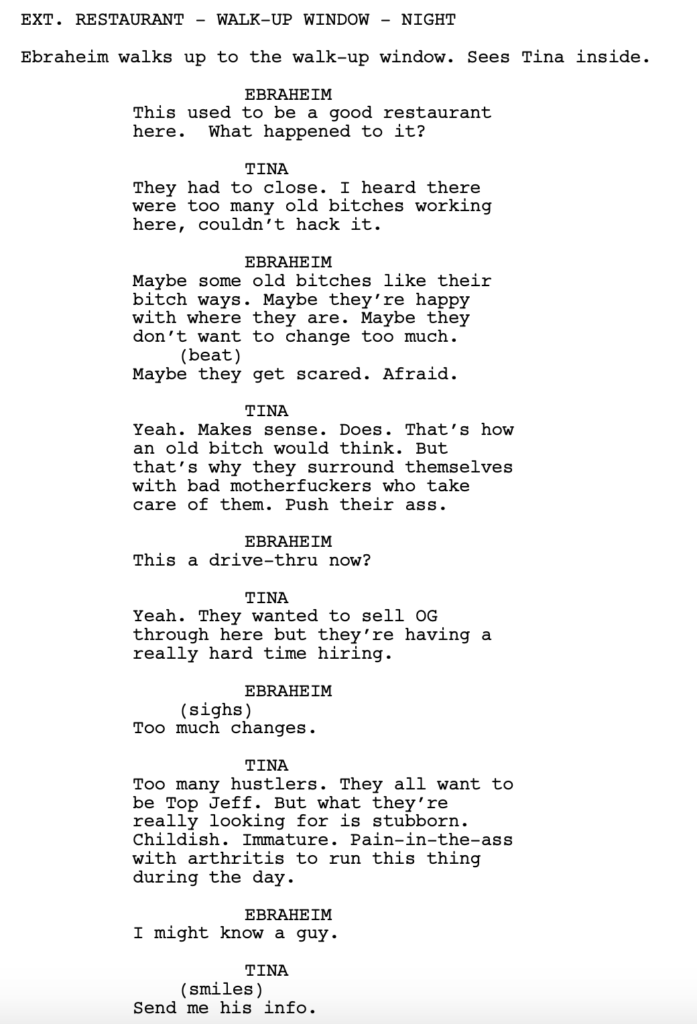
7) Nobody’s angry just because they’re angry. They’re angry because they’re scared – I read a lot of scripts where characters are angry because the writer wants an angry character. But they don’t think about WHY that character is angry. And WHY they’re angry is the whole ball of wax. Because most of the time, they’re angry because they’re scared. Cause they don’t think they can hack it. Like Richie. Richie is my favorite character in this show because of that inner conflict. He’s the loudest. He’s the harshest. He screams at people all the time. When he messes up, it’s always somebody else’s fault. And it’s all because he’s terrified. He’s terrified he’s going to be exposed for the scared little kid he actually is. So when a character is angry, give them a reason for being angry. I promise you, the character is going to come off as so much more genuine if you do.
8) Money makes the TV show go round – Money money money monaaaaay. MONNNAAAY. Money is a wonderful friend in any dramatically told story, but especially in television. The thing with TV is that it doesn’t have that ticking time bomb urgency that a movie can have since a movie is only 2 hours. With TV, the timespan is always longer and so we lose out on that urgency. You can compensate for this by adding a money issue. Your main character(s) should be under some sort of monetary deadline. With The Bear, in order to get the investment for the restaurant, Carmy has to agree that if his uncle isn’t paid back in full within 18 months, the uncle gets the building. Never having enough money is such a universal experience that we always relate to money problems in stories.
9) Make sure to balance the sour with the sweet – The Bear puts its characters through the wringer. It really whacks them up against the head with a lot of crap. If all you do, though, is hurt your characters, your reader will grow frustrated. We’re not sadists. We need good amongst your bad. And The Bear is good at this. It makes sure to intersperse the bad with a nice little occasional scene that gives you the warm and fuzzies inside. In the first episode of season 2, there’s a scene near the end of a tough episode where Sydney, the smart-as-a-whip prodigy sous-chef, runs after Tina, the old school “been here forever” cook who’s accepted her lackluster lot in life. Sydney asks Tina if she would be her assistant. And we just see Tina’s eyes light up when she realizes what Sydney is asking. It’s such a sweet moment as well as a NEEDED ONE. Because we need the sweet within the sour.
10) Scenes With a Lot of Characters In Them – The Bear has a ton of scenes with a lot of characters in them. For these scenes to work, you need to know who your CONTROLLING CHARACTER in the scene is. Your controlling character is the character who wants the most out of the scene. They have the big objective that’s driving the core of the conversation. So in Season 2, Episode 5, five minutes in, Uncle Jimmy (the investor) shows up to the restaurant to check on things. He walks into a room with, literally, seven other characters and everyone in the scene talks at some point. But the scene keeps coming back to Uncle Jimmy because he’s the controlling character. He is the one who wants the most out of this scene. He wants to know that they’re going to be ready to freaking open when they said they’re going to be ready. So that’s what drives most of the conversation, is his questions and directives regarding that topic.
100 dollars off a Screenplay Consultation (feature or pilot) if you e-mail me with the subject line, “THE BEAR!” carsonreeves1@gmail.com. What are you waiting for??
Genre: Action-Thriller
Premise: When her family is abducted, a disgraced submariner must pilot a narco submarine to its destination in less than eight hours or her husband and daughter will be killed.
About: Today’s writer is from Kansas City. He studied film at the University of Kansas. This script got him on last year’s Black List.
Writer: Andrew Ferguson
Details: 117 pages
 Cobie Smulders for Cora?
Cobie Smulders for Cora?
In my newsletter I said, “Someone needs to write a new sub spec.”
Well guess what? Someone has!
Let’s see what it’s all about.
27 year old Cora Cameron was training to be a submarine captain when she contributed to killing her partner in an underwater military training exercise. Ever since, she’s been a heavy alcoholic who desperately is trying to have a relationship with her young daughter, Penny, and her estranged husband, Nolan.
One day she’s kidnapped and taken down to Baja, Mexico, where she’s plopped down into the biggest private narco sub in the world. This thing is gigantic. But it’s also brand new and still has some kinks to be worked out. Cora receives a call from a mysterious voice that tells her this is his sub and she has exactly eight hours to deliver it up north to California. Or else her husband and daughter are dead meat.
Cora is joined by a Mexican crew of thugs. Only one of them speaks English. And none of them trust her. To make things worse, the DEA is onto them immediately. So they start flying in planes, floating in boats, all to track this sub. Gamble, the nice government guy, is looking for any way he can help Cora survive this. Huxley, the bad government guy, wants to blow the sub out of the water and end this immediately. Because Cora has to surface her cheaply-made sub every couple of hours, Huxley keeps getting Hulk-smash opportunities.
But then something happens that truly throws everything off (spoiler). It turns out it’s not drugs that they’re hauling, but rather, explosives! And not just small explosives. Collectively, these explosives can take out a pretty big target. The question is, what is that target? And was this always going to be a suicide mission regardless of whether Cora followed the rules? One thing’s for sure. Cora must rely on every trick of her failed submarining career to get out of this mess!
The other day I was watching Shark Tank, a show where people stand in front of a panel of billionaire businessmen and try to get them to invest in their small companies. In the first segment, some woman was pitching her ice cream business. As soon as she was finished, the sharks started asking all these business questions with elaborate acronyms like, “What’s your ROIBMC?” Or, “What’s your bottom top out reverse expectation level for 2022?” The poor woman had no idea what they were talking about and quickly crashed and burned.
Cut to the next team, two flashy tech guys selling something for your car that lowers emissions. The sharks asked them the same questions. But this time, the guys not only had answers, but threw back unique financial terms about the emissions market even the Sharks didn’t know. They ended up getting a deal.
Why do I tell you this?
Because, in screenwriting, you gotta be able to sell us on the fact that YOU ARE AN EXPERT ON YOUR SCRIPT. If you’re writing about submarines, you have to convince me that you are Mr. Submarine Man. I say this as someone who’s read around 75 submarine screenplays. Cause I can PROMISE YOU there’s a big difference between the ones where the writer knows submarines, and the ones where they don’t.
The ignorant writer ignores the details about subs because THEY DON’T KNOW THE DETAILS. And when you ignore the details, you are, by definition, writing a generic story. Have have ever heard of a generic script that has taken the world by storm? Cause I haven’t.
Everything about the submarine stuff here is top notch. We’re repeatedly getting specialized info that only a sub expert would know.
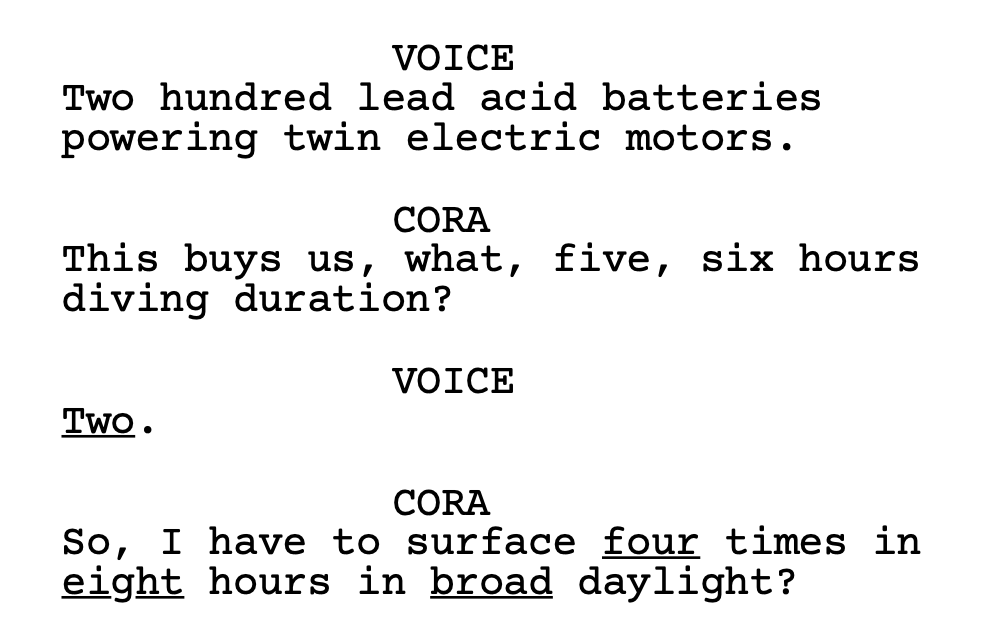
For that reason, I BELIEVED in the story. And believing is critical. Cause it’s what suspends disbelief. But it’s only half of the game. The other half is writing an entertaining story.
One of the best ways to write an entertaining story is to KEEP YOUR READER OFF-BALANCE. The more your reader feels like they’re standing on solid ground, the more you’re losing them. You want the reader to feel off-balance and unsure. That’s when you have them. Think of movies like Memento and I Care a Lot and Parasite and Missing and even Emily the Criminal. Those movies never allow you to stand on solid ground. You’re always a little unbalanced. And that’s great.
Can you get away with not doing this?
Sure.
If you’ve set up characters who we love and a situation we’re emotionally invested in, you don’t need to keep us as off-balance. This is what Taken did so well. We liked her. We liked him. So we wanted him to save her. That’s all we needed!
The problem with storytelling is that even when you set up your characters perfectly, there’s this weird x-factor that you have no control over where, sometimes the characters don’t click with the reader. Even if you’ve done a “good job” with them. Which is why I encourage writers to do your best in the character department and then GIVE YOURSELF INSURANCE with some fun unexpected plot developments along the way.
I’ll give you a great example from the show Hijack, on Apple, about a guy trying to get home but he ends up on a flight that gets hijacked. (Spoilers) The first episode is a relatively straight-forward hijacking. Nothing happens that we don’t expect to happen. As the episode goes on, the main character is watching all of the hijackers carefully.
At the end of the episode, as we’re cutting back and forth between the plane and our hero’s family in the UK, who have been made aware that he’s on a hijacked plane, a cop asks the wife, “What does your husband do?” Then back on the plane, we see our hero stand up in the aisle and brazenly approach the hijackers. Cut back to the family where the wife and son say, “It’s complicated what he does.” “Well, what is it?” “Basically,” they say, “He’s a negotiator.”
We then cut back to the plane where the hijackers see our hero approaching, point a gun at him and ask him what he’s doing. He tells them that as the people on this plane get more rowdy and as they deal with more on more issues on the ground, that it’s going to get harder and harder to accomplish their mission. “So,” he says, “I’m going to help you hijack this plane.”
BOOM.
This is what I mean by a twist that unsettles the narrative. It puts the reader on edge. They’re no longer sure what happens next.
That’s how I judge a lot scripts like Subversion. Do they keep me off-balance? Subversion has one big twist. Which is that they’re not delivering cocaine like they originally assumed. They’re delivering a bomb. Which is a pretty good twist. But is it as good as Hijack? No. Which is a reminder that there is a SCALE to these choices. Not any old unexpected choice will do. You have to be creative. The more imaginative you are than the next writer, the better you’re going to do in this business.
So, for Subversion, I thought it was a solid script. There were a lot of interesting ideas in here, such as the fact that they had to keep surfacing throughout the journey, which put them in danger. Half the movie is about the government people who are trying to neutralize the sub and I liked that some of them wanted to kill Cora and others were trying to pull this off without any causalities. It made for a lot of suspenseful moments.
You wouldn’t be wrong to call this “Die Hard on a sub.” In fact, if the lead character was a 40 year old man and this spec was written in 1994 as opposed to 2023, I have no doubt it would’ve sold for 1.5 million dollars. But, times they have a changed. It’s still a decent script. It could even be a movie. We’ll have to see. I just wanted it to be a little more off-balance.
[ ] What the hell did I just read?
[ ] wasn’t for me
[x] worth the read
[ ] impressive
[ ] genius
What I learned: The better you are as a writer at manipulating emotions – creating characters that make readers *FEEL* things, the less flashy sh— you have to do in your script. If you’ve been told more than once by readers that they’ve teared up reading your scripts, then you can write scripts like Taken and not have to add a lot of flashy plot developments. But if you’re weak with character? You’re more of a concept guy? Or plotting is your thing? Then you definitely need to add more twists and turns. You’ve got to shock the reader more because, the reality is, they’re probably not all that invested in your character’s journey.
Genre: Action/Adventure
Premise: Indiana Jones is pulled into one last adventure when his goddaughter asks him to help her find a dial created by Archimedes that has the power to travel through time.
About: The fifth and final Indiana Jones film, which is said to have cost 280 million dollars, pulled in just 60 million dollars over the weekend, continuing a trend of weak box office showings this year. This is the first Indiana Jones movie not directed by Steven Spielberg. It was directed by James Mangold, who Lucasfilm was so happy with that they hired him to make a Star Wars movie about the origins of the Force.
Writers: Jez & John-Henry Butterworth AND David Koepp & James Mangold (characters by George Lucas and Phillip Kaufman). Phoebe Waller-Bridge is said to have done some script work as well
Details: 150 minutes
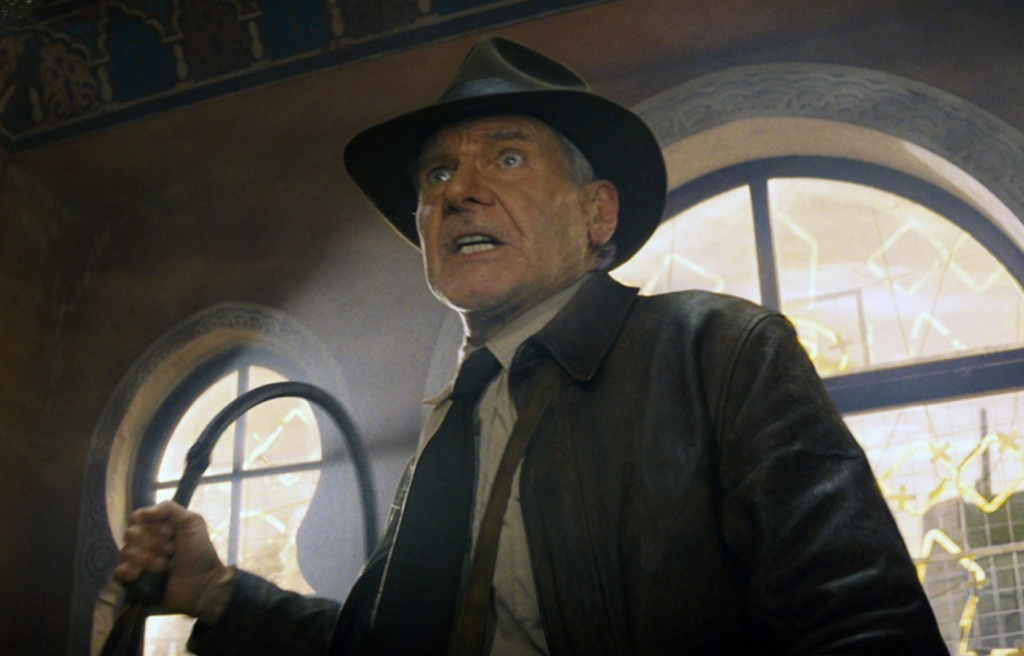
As I approached the digital ticket kiosk to purchase my entry into Indiana Jones and the Dial of Destiny, I attempted to bypass the annoying button prompts by simply humming the Indiana Jones score, figuring the kiosk would know what movie I wanted and simply ask for my credit card info.
Not only did that not happen, the pleasant pimple-faced teenager tasked with monitoring the kiosks came over to ask me if I was okay.
But you know what did happen?
I got to see a good Indiana Jones movie.
It’s unfortunate that Indiana Jones number 5 wasn’t number 4. Cause number 4 was a disaster of epic proportions. It was so bad, in fact, that the screenwriter, David Koepp, came out and said that he knew he was going to be taking bullets for the screenplay. That NEVER happens, where the screenwriter admits before the movie has come out that it’s bad.
Dial of Destiny, even though it’s not a perfect film, is a film where you can tell they did everything in their power to write a good screenplay.
The thing with the scripts for these gigantic blockbuster movies is that they’re often less about writing a cohesive story than they are pleasing the 10 major creative forces on the film, and patching together the ugly disconnected mess of ideas from those forces with bridges just strong enough to keep the movie together.
That’s not the feeling I got from this movie at all. Maybe it’s because this was the last Indiana Jones and they didn’t have to worry about setting up future storylines. Which meant they could write the best story possible. Or maybe they just sat down and kept at it until they got the screenplay right.
The film is set in 1969. I think Indiana is 75 years old in this iteration. He lives in New York by himself in some apartment downtown. Unlike the glory days when he was young and sexy and girls used to blink at him with “I luv you” written on their eyelids, now Indiana is old and no one cares about his lectures anymore. Which is probably why he retires.
Indiana gets a drink at a local bar and is approached by Helena, his goddaughter. Helena tries to get Indiana to don the hat and whip one more time to search for something called the Antikythera, a dial that Archimedes created that is rumored to be able to manipulate time. Indiana then surprises Helena by bringing her back to the school and showing her that he already has the Antikythera. Or, at least, one-half of it.
This is when it’s revealed that Helena is not a very cool goddaughter. She steals the Antikythera and heads off to Africa to sell it. Around this time, Indiana learns that a Nazi named Dr. Voller is looking for the Antikythera as well and may have some nefarious use for it. Which means that old Indy will have to don the hat and whip again. And off he goes.
In true 2023 blockbuster McGuffin fashion, there are multiple McGuffin pieces to search for. Indy and Helena reluctantly join forces, traveling around the world to find out where the second half of the Antikythera is. Just when they find it, Dr. Voller sweeps in and takes it, and then takes *them* on a time-traveling trip to the beginning of World War 2, where he plans to win Germany the war. Except they don’t end up in 1939. They end up in 214 BC. And not even Indy knows how they’re going to get back home from here.
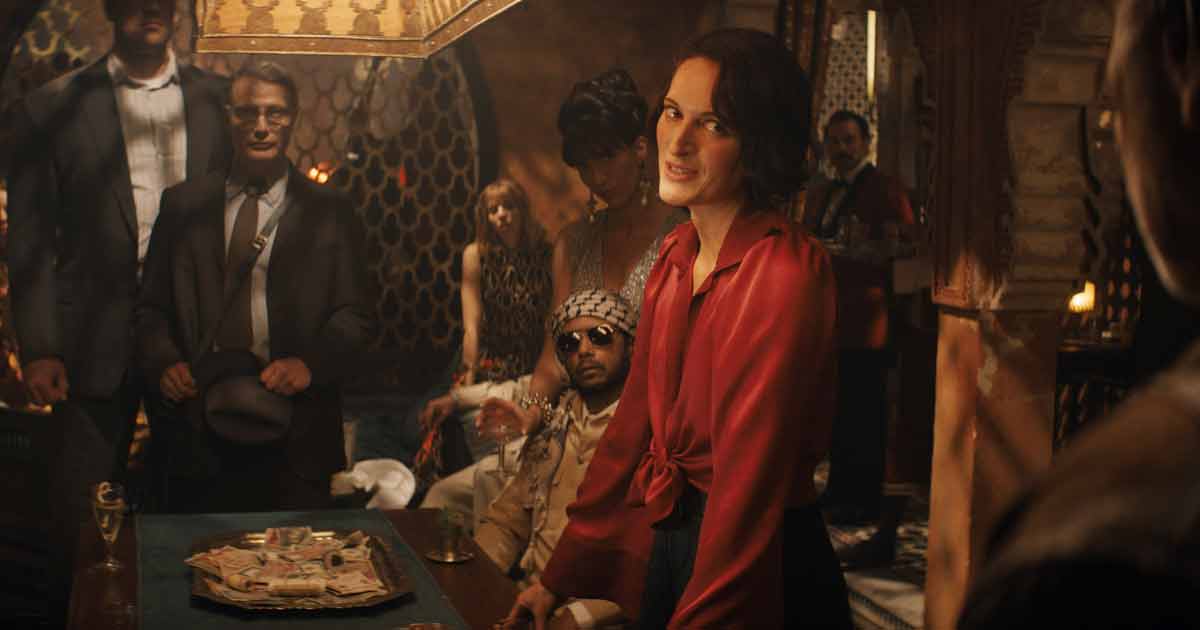
Here’s the thing about this movie. It’s probably the best Indy movie outside of the first one. With that said, I’d still rather watch the first three again than I would this one. How does that make sense? Because an action movie with an 80-year-old star just doesn’t work. To be fair, Harrison Ford is probably the only actor on the planet who could make an 80-year-old action movie work. But it still just feels wrong. Which is why I’d still rather watch those first three films.
But anyone saying this isn’t a good movie is crazy.
It’s a good movie. Maybe even a really good movie.
And I’m going to give you a comp so you understand why this movie is good. Jurassic World Dominion. Both these movies are trying to do similar things. They very much operate in the same universe. They even try to rip off a combo of Indiana Jones and Han Solo to make that awful pilot character Kayla Watts.
The difference is that this screenplay is a million times tighter. Jurassic World Dominion is the bad version of Dial of Destiny. It’s what could’ve happened if bad screenwriting would’ve reined.
The McGuffin was cool. There were always goals, stakes, and urgency. The bad guy was cool. The dynamic between Indiana and Helena was strong. Keep in mind that this was the first we’ve ever seen a female co-star with Indy that wasn’t a love interest. That alone made their dynamic feel fresh. Most importantly, the writers did a really good job keeping the reader up to date with what was going on.
I always knew what leg of the story we were on and what they were after. This is something Hollywood has gotten so lazy with recently, especially in the last phase of Marvel films, where the plot not only got convoluted, but the writers didn’t prioritize keeping you up to date with what the characters were after and why it was important. These writers on Dial of Destiny did a great job of that.
It sounds like some people had a problem with Helena. Like I said, I thought the dynamic was interesting between her and Indy. I always look for twists on the conflict between the movie’s primary team-up characters and this movie had that. If Helena would’ve just been some random chick who hated Indy and that’s where the conflict came from, that would’ve been boring. The fact that she’s family, though, adds another layer. It creates a “positive” that’s pulling at their dynamic as opposed to just a “negative.” I liked that.
I just want to take a moment to appreciate what’s happened in Phoebe Waller-Bridge’s career. Phoebe Waller-Bridge was a nobody until someone forced her to write this play called “Fleabag,” which she then turned into a show, which received a lot of acclaim, which got her meetings everywhere. And the next thing she knows SHE’S SHARING SCREENTIME WITH HARRISON FORD ON AN INDIANA JONES MOVIE.
ALL THIS HAPPENED BECAUSE SHE WROTE SOMETHING. I said the same thing about Taylor Sheridan in my newsletter. He was a nobody. Now he owns a ranch as big as Los Angeles. All because he wrote something. Everybody who’s reading this right now. Know this: You have a very powerful tool in your hands. If you use it well, who’s to say you can’t be on a giant franchise set in three years? It seems impossible but it obviously isn’t. Phoebe Waller-Bridge is proof of that.
Okay, back to the review.
Some people didn’t like the crazy third act. A few of you will probably wonder how I can prop up this screenplay with a third act this bonkers. I’ll admit that the third act doesn’t quite work. The movie didn’t do a good enough job setting it up. What does this time and this war really have to do with Indiana Jones’s legacy?
In regards to screenwriting, though, here’s the way I see it: Good writers take risks. They take big swings. So I admire Mangold and all the writers who worked on this taking a big swing like that. It didn’t quite work. Okay. But I’d rather take that big swing than aim for that double out to right-center field. If you’re going out, as the Indiana Jones franchise is, go out swinging!
This is the second best-written Indiana Jones movie of the five films. Period. But, as a movie, it’s limited by its 80-year-old action star. Which is why I wish they would’ve made this the 4th film and ended the franchise there. Indy at 63 could’ve made everything here a lot more convincing. RIP Mutt.
[ ] What the hell did I just watch?
[ ] wasn’t for me
[x] worth the price of admission
[ ] impressive
[ ] genius
What I learned: Pacing vs. Character Development. You’ll often have to balance how much character development you can include in a script versus how fast you can keep your story moving. One of the problems people had with Helena is that she’s very capable in dangerous intense action-packed situations. But how? We’re not given enough information on that. Here’s the answer: I can almost guarantee that that information was in earlier drafts of the script. But they needed to keep the pace moving. And when you need the pace ratcheted up, the first thing that goes is character development on SECONDARY CHARACTERS. You don’t take character development away from your hero. You take it away from the other characters. Which is why Helena feels a little thin. In the end, they left us with some quick mug shots of Helena, which indicated she did have a rough and tumble past. But it wasn’t enough to truly explain everything she was able to do. In a perfect world you would have both pace and character development. But if you have to choose, script pace is more important than secondary character development. So lean towards pace. A sloggy script read will negate any care we have about your characters anyway.
Note: I am taking the holiday off tomorrow. Happy 4th everyone! Seeya Wednesday!


